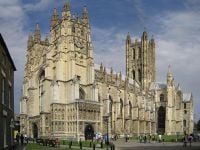Richard Hooker
| Part of a series on Anglicanism | |

| |
| Organization | |
|---|---|
|
Anglican Communion | |
| Background | |
|
Christianity | |
| People | |
|
Henry VIII | |
| Liturgy and Worship | |
|
Book of Common Prayer | |
- This article is about the Anglican theologian. For the author who wrote under this pseudonym, see H. Richard Hornberger.
Richard Hooker (March 1554 – November 3, 1600) was an influential Anglican theologian. He is arguably the co-founder (with Thomas Cranmer and Matthew Parker) of Anglican theological thought.
Hooker was born in the village of Heavitree in Exeter, Devon, and educated at Corpus Christi College, Oxford, where he became a fellow in 1577. In 1584 he married, resigned from his college position, and became rector of Drayton Beauchamp in Buckinghamshire. In 1585, he was appointed Master (Rector) of the Temple Church in London, and soon came into conflict with Walter Travers, a leading Puritan and Assistant (Reader) at the Temple. Nonetheless, the two men remained on friendly personal terms.
In 1592 Hooker became a canon at Salisbury Cathedral and Rector of the parish of Boscombe in Wiltshire. In 1595 he became Rector of the parish of Bishopsbourne in Kent.
Hooker's most well-known work is Of the Lawes of Ecclesiastical Politie, the first four books of which were published in 1594. The fifth was published in 1597, while the final four were published posthumously. This argued for a middle way (a "Via Media") between the positions of the Roman Catholics and the Puritans. Hooker argued that reason and tradition were important when interpreting the Scriptures, and argued that it was important to recognise that the Bible was written in a particular historical context, in response to specific situations: "Words must be taken according to the matter whereof they are uttered." (Lawes IV.11.7).
It is a massive work, and its principal subject is the proper governance of the churches ("polity"). The Puritans, then known as the "Geneva Church," for John Calvin's reforms, were advocating the demotion of clergy and ecclesiasticism, and Hooker attempts to work out which methods of organizing churches are best. What was at stake behind such a seemingly theological argument was the position of the Queen as the head of the church. If doctrine were not to be settled by authorities, and if Martin Luther's argument for the priesthood of all believers were to be followed to its extreme and there were to be government by the Elect, then having the monarch as the head of the church was intolerable. On the other side, if the monarch were appointed by God to be the head of the church, then local parishes going their own ways on doctrine were similarly intolerable. Hooker worked from Thomas Aquinas, but he adapted scholastic thought in a latitudinarian way. He argued that church organization, like political organization, is one of the "things indifferent" to God. Minor doctrinal issues were, he said, not issues that damned or saved the soul, but rather frameworks surrounding the moral and religious life of the believer. Thus, there were good monarchies and bad ones, good democracies and bad ones, that what mattered was the piety of the people. At the same time, Hooker argued that authority was commanded by the Bible and by the practice of the early church, but authority was something that had to be based on piety and reason rather than automatic investiture, for authority had to be obeyed, even if it was wrong, but it could be remedied by right reason and the Holy Spirit. Notably, Hooker's affirmation of the power and propriety of bishops was not absolute, and he comes close to arguing for the ability of the governed to take back authority. He thus avoided some of the simplistic extremes being pursued by High Church thinkers.
Another important work was Hooker's sermon, A Learned discourse of Justification. In this he defended his belief in the Protestant doctrine of Justification by faith, but argued that even those who did not understand or accept this could be saved by God. This therefore included Roman Catholics, and emphasised Hooker's belief that Christians should concentrate more on what united them, rather than on what divided them.
Hooker's emphases on reason, tolerance and inclusiveness considerably influenced the development of Anglicanism, as well as the thinking of John Locke. Locke quotes Hooker numerous times in The Second Treatise of Civil Government. In the Church of England he is celebrated with a Lesser Festival on 3 November.
External links
- Hooker's works online
- Biographical sketch
- Exeter cathedral page
- Hooker at the Temple Church
- Richard Hooker in Dictionary of British Philosophers
de:Richard Hooker ko:리처드 후커 ja:リチャード・フッカー pl:Richard Hooker
Credits
New World Encyclopedia writers and editors rewrote and completed the Wikipedia article in accordance with New World Encyclopedia standards. This article abides by terms of the Creative Commons CC-by-sa 3.0 License (CC-by-sa), which may be used and disseminated with proper attribution. Credit is due under the terms of this license that can reference both the New World Encyclopedia contributors and the selfless volunteer contributors of the Wikimedia Foundation. To cite this article click here for a list of acceptable citing formats.The history of earlier contributions by wikipedians is accessible to researchers here:
The history of this article since it was imported to New World Encyclopedia:
Note: Some restrictions may apply to use of individual images which are separately licensed.
